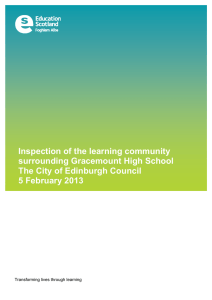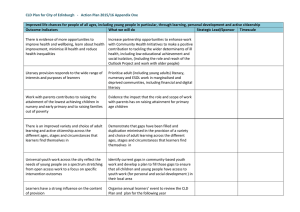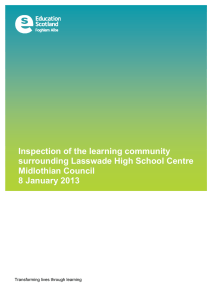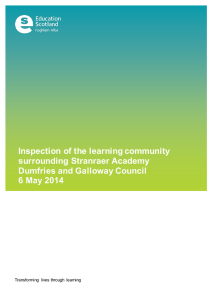Inspection of the learning community surrounding Balfron High School Stirling Council
advertisement
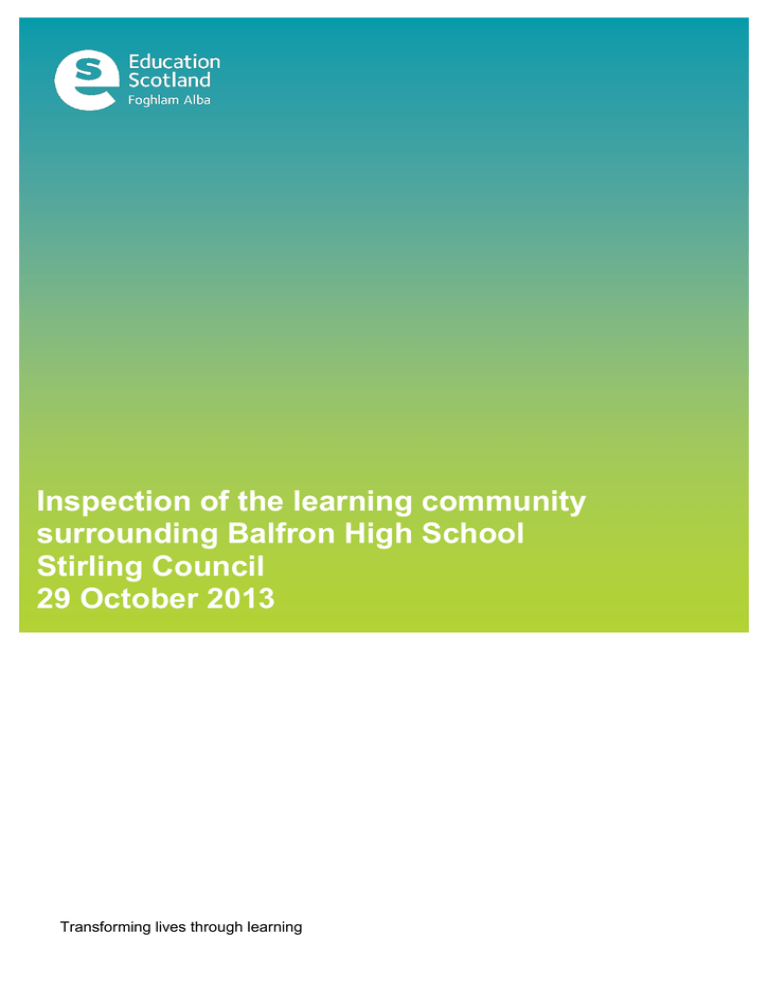
Inspection of the learning community surrounding Balfron High School Stirling Council 29 October 2013 Transforming lives through learning 1. Context Community Learning and Development (CLD) partners within the area of Balfron High School were inspected by Education Scotland during September 2013. During the visit Education Scotland staff talked to children, young people and adults. We worked closely with local CLD managers, CLD providers, partners, paid staff and volunteers. We wanted to find out how well partners are improving the life chances of people living in the community through learning, building stronger more resilient communities and improving the quality of services and provision. We also looked at how well, paid staff and volunteers are developing their own practices and how well partners, including schools are working together. We looked at some particular aspects of recent work which were identified by partners including: implementation of the CLD Regulations and succession planning. 2. How well are partners improving learning, increasing life chances, promoting and securing wellbeing? Partners are improving learning for small numbers of young people and adults. Due to the largely affluent nature of the community, Balfron is not a priority for council staff in comparison to other areas of Stirling Council. Some early work with Arnprior Nursery is targeting parents in need of literacy support. A few adult learners are gaining accreditation, although there is scope to extend this. While the number of young people participating in the Duke of Edinburgh’s Award at Bronze level is increasing and compares well with national participation, many young people are not completing the award. Youth Services staff and staff from Balfron High School need now to support young people to progress to their next stage of learning, for example by helping them to complete their portfolios. Positively targeting young people to participate in a greater range of accredited learning would help young people to achieve better. In response to a number of sudden deaths in the learning community, CLD and partners established a neighbourhood approach that includes mental health. There are some encouraging signs that agencies are planning interventions which are beginning to address wellbeing. A few young people are working towards Activity Agreements to help them increase life chances. A few are also benefiting from housing support to secure a tenancy. As most data is collected at council level it is difficult to gauge improvement within the learning community. Adult learners are accessing opportunities and some are achieving well. English for speakers of other languages learners are developing language skills, improving confidence and employability. Information and Communications Technology (ICT) learners are learning new skills for example, ordering online and communicating better with others. Learners attending literacy and numeracy classes report positive outcomes from their learning. Small numbers progress to accreditation. This could usefully be extended. Young people are accessing a good range of after school sporting activities and a few are progressing to local, regional and national competitions. Those attending the Kippen Youth Group are at an early stage of recording their achievements. A few are learning important life skills through completing a first aid course and most are working towards a Dynamic Youth Award. 1 There is potential for young people across the learning community to develop leadership skills in partnership with Balfron High School. There is scope for partners to help young people plan their learning as they move into the Senior Phase. Across the Balfron learning community a greater focus on securing skills for learning life and work would be beneficial. A good range of effective community organisations are delivering strong outcomes that are improving life chances for local people. A range of very good environmental projects are making significant impacts in some of the rural villages. A network of footpaths provide safer links for the public. The Buchlyvie community are improving local facilities through developing a play park. Volunteering across the local community is strong with some residents gaining new skills and learning how to work with others. Croftamie Community Transport scheme is helping to reduce isolation by providing access to affordable transport. Local people are improving local buildings for community use. The recently refurbished Killearn Village Hall provides a very good focal point for the community. The effective management committee has a robust five year plan in place to help continue to improve community life and wellbeing. Strathblane Community Council contributes to the Community Plan and successfully address local issues such as transport, roads and licensing. Stirling Voluntary Enterprise (SVE) supports local groups well to achieve their goals and improve wellbeing. They are working well with Route 9, an organisation for people with mental health problems to secure a community café and arts centre. A strong network of community newspapers helps to connect communities and inform the wider community about issues affecting them. There is potential to involve more young people in community organisations to assist them to plan for the future. 3. How well are partners working together and improving the quality of services and provision? The South West Rural Forum brings together representatives from community organisations to help plan for improvement. They are now influencing the delivery of services. Council staff from the Balfron learning community are active members of the CLD Quality Group, contributing to a Stirling Council Quality Action plan. It is not yet clear what impact this has had locally. A pilot exercise in shared self-evaluation has taken place with partners. Improved access to participation data is assisting with planning within Stirling and there are plans to extract this at a learning community level. Council staff are well supported and have good access to training and Continuing Professional Development and this is resulting in improvements in practice and confidence. They are encouraged to seek registration with the CLD Standards Council and use i-develop to facilitate professional learning. Workforce development with partners is progressing although is not yet embedded. Community groups and volunteers are benefiting from training provided through the Community Engagement team and SVE. Libraries are reviewing their use of volunteers in the light of recent Welfare Reforms. Whilst reporting to stakeholders via community newspapers is of good quality there is scope to extend this across partners, for example through ICT and social media. Sharing of data across partners would also enhance planning. An increased focus on planning for the delivery of the key functions of CLD across the learning community would be helpful. 2 This inspection of learning and development in the learning community surrounding Balfron High School found the following key strengths: strong support by local staff to learners and community groups; strong and vibrant community organisations; and improving community facilities. We discussed with partners how they might continue to improve their work. This is what we agreed with them: in partnership with Balfron High School, an increased focus on helping young people learn and achieve through the Broad General Education and the Senior Phase; increased use of progression leading to accreditation and other achievement opportunities for young people and adults; improved arrangements for the planning and delivery of CLD functions across the learning community; and greater focus on self-evaluation leading to improvement. 4. What happens at the end of the inspection? There are some improvements needed, but because partners have a good understanding of their strengths and areas for improvement, and communities are achieving well, we have ended the inspection process at this stage. We will monitor progress through our regular contact with the local authority. Our Area Lead Officer along with the education authority will discuss the most appropriate support in order to build capacity for improvement and will maintain contact to monitor progress. Sheila Brown HM Inspector 29 October 2013 3 Additional inspection evidence, such as details of the quality indicator evaluations, for this learning community can be found on the Education Scotland website at http://www.educationscotland.gov.uk/inspectionandreview/reports/othersectors/com munitylearninganddevelopment/BalfronHSLCStirling.asp . If you would like to receive this report in a different format, for example, in a translation you can contact the administration team on 01506 600381. If you want to give us feedback or make a complaint about our work, please contact us by telephone on 0141 282 5000, or e-mail: complaints@educationscotland.gsi.gov.uk or write to us, addressing your letter to The Complaints Manager, Denholm House, Almondvale Business Park, Livingston, EH54 6GA. Text phone users can contact us on 01506 600 236. This is a service for deaf users. Please do not use this number for voice calls as the line will not connect you to a member of staff. Crown Copyright 2013. Education Scotland 4


